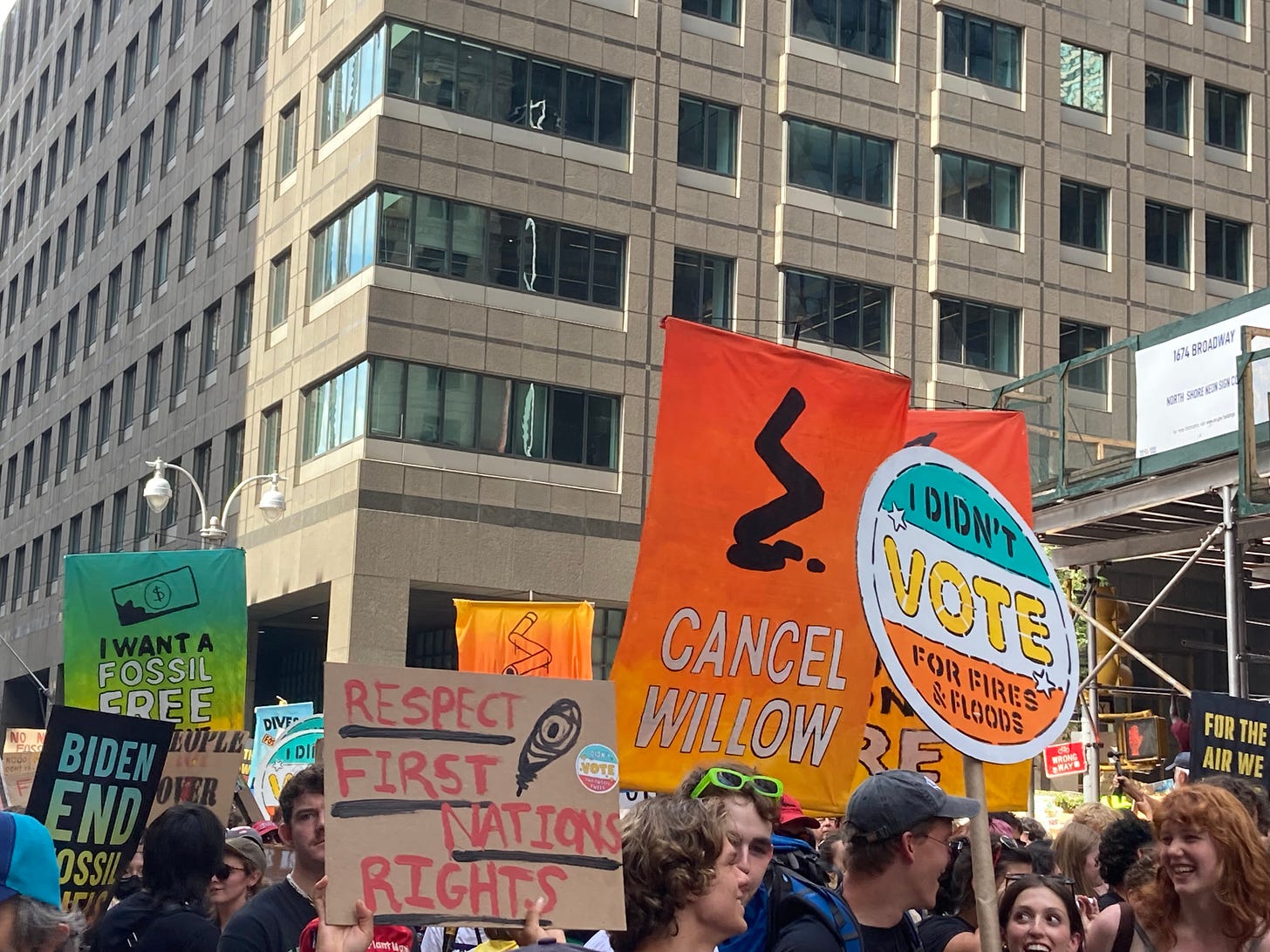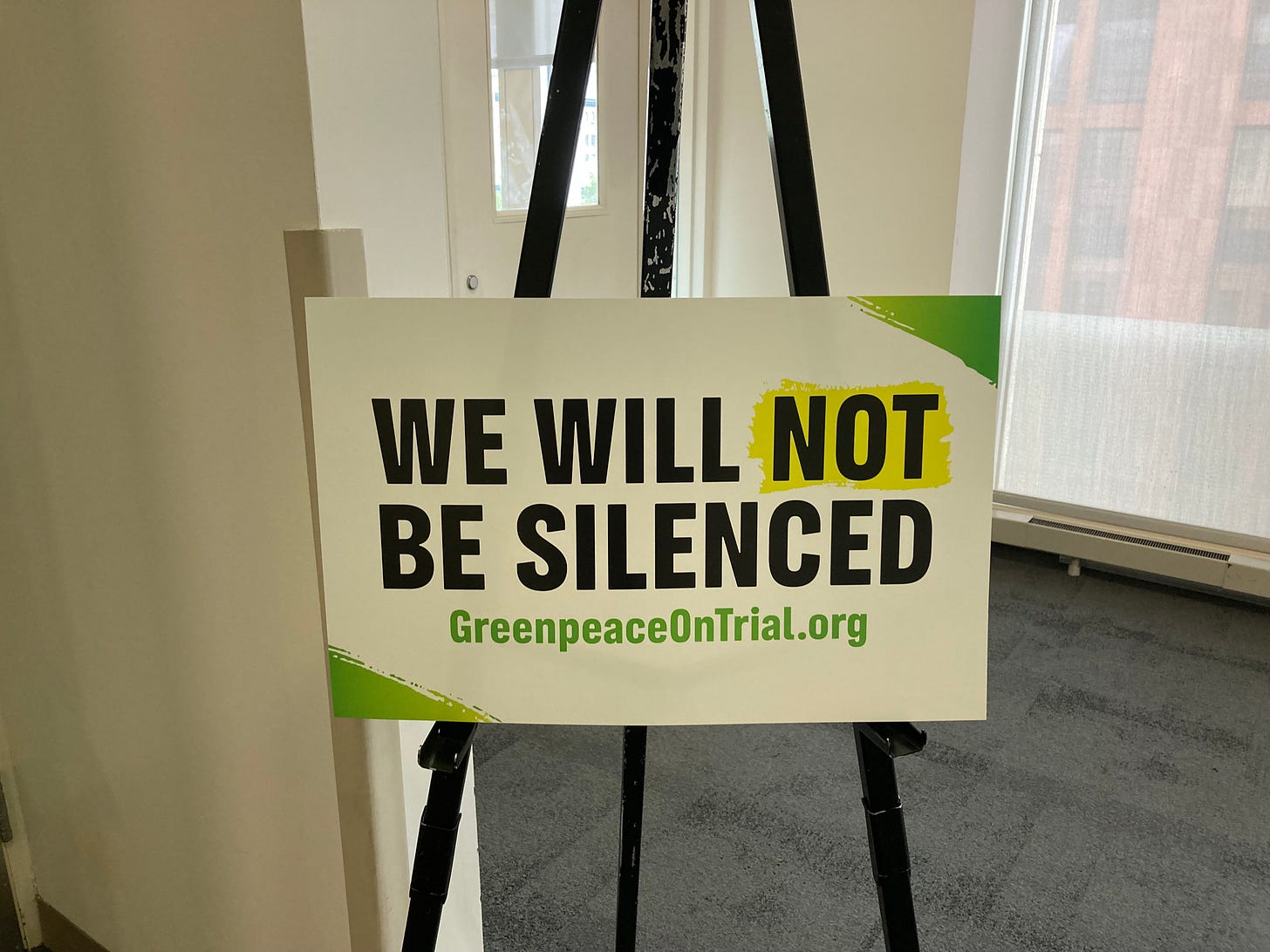Greenpeace Trial in North Dakota Concludes. The Coming Verdict Could Be Devastating for Environmental Advocacy and Free Speech Rights
An independent trial monitoring committee has expressed serious concerns with the trial proceedings in a case that is an “attack on the First Amendment.”
Climate activists march in the streets of Manhattan during the March to End Fossil Fuels in New York City in September 2023. Credit: Dana Drugmand
Trial is wrapping up in one of the most consequential and high-stakes First Amendment cases in recent US history, and the verdict could set a chilling and dangerous legal precedent at a time when American democracy is already facing unprecedented attacks.
A jury in North Dakota heard closing arguments today in the $300 million SLAPP case brought by the oil and gas pipeline corporation Energy Transfer against Greenpeace. SLAPP stands for “strategic lawsuit against public participation,” and it is a tactic used by powerful interests to try to silence critics and quash dissent. Energy Transfer has targeted Greenpeace over the Indigenous-led Standing Rock protests against the company’s Dakota Access crude oil pipeline in 2016, claiming that Greenpeace played a major role in the uprising. Greenpeace says this is false, as the organization did not orchestrate the protests but instead answered a call from Indigenous water protectors for direct action training support.
Still, Greenpeace could be found liable for the claims Energy Transfer has brought (including defamation and tortious interference) and compelled to pay hundreds of millions of dollars in damages, which could bankrupt the organization’s US chapter. But the impacts of such an outcome extend beyond potential financial ruin, as One Earth Now previously reported. “A bad ruling in this case could put our rights and freedoms in jeopardy, for all of us, whether we are journalists, protestors, or anyone who wants to engage in public debate,” Greenpeace USA’s interim executive director Sushma Rama said during a press briefing last month.
The jury could deliver a verdict in the case this week. And according to one environmental attorney who has been closely following the trial, the verdict in unlikely to land in Greenpeace’s favor.
“Greenpeace is very likely to lose this case. Not because it did anything wrong, but because this trial was fundamentally unfair,” Steven Donziger, an environmental and human rights lawyer, said during a March 14 livestream session he hosted on his Youtube channel.
“This is not just an attack on Greenpeace. It’s an attack on the entire climate movement. It’s an attack on Indigenous rights, and it’s an attack on the First Amendment.” - Human rights and environmental attorney Steven Donziger
Donziger has himself faced what he says is probably the biggest SLAPP suit ever filed, as Chevron targeted him personally, initially suing him for $60 billion; the judge then pursued criminal contempt charges in the nation’s first private corporate criminal prosecution. Chevron went after Donziger because he secured a nearly $10 billion judgment against the oil giant for its poisoning of an Indigenous community in Ecuador. “Rather than pay the people the company harmed, rather than comply with court orders that it clean up its toxic disaster in the Amazon, Chevron sued me and ultimately had me locked up for almost three years,” Donziger explained in a March 16 video message.
Now, the very same law firm that represented Chevron in targeting Donziger is representing Energy Transfer in its SLAPP case against Greenpeace. Donziger said this law firm, Gibson Dunn, is selling a playbook to its corporate clients, one that weaponizes the legal system to try to silence critics of the fossil fuel industry.
“This is not just an attack on Greenpeace. It’s an attack on the entire climate movement. It’s an attack on Indigenous rights, and it’s an attack on the First Amendment,” Donziger said.
He and other prominent civil and human rights attorneys have been attending the trial in North Dakota and independently monitoring the proceedings. And over the course of the last three weeks, this trial monitoring committee has expressed serious concerns about what it has observed.
Jury Bias and Trial Shrouded in Secrecy
For starters, the trial monitors point to evidence of jury bias. Most jurors admittedly have ties to the fossil fuel industry, either through working directly in the oil and gas sector or having close family members employed by the industry. One juror even does work for a company that owns a minority interest in the Dakota Access Pipeline. When that juror heard that company mentioned by name during the trial and raised this potential conflict of interest to the court, the judge questioned the juror privately and then allowed the juror to remain on the panel.
Multiple requests made by Greenpeace to have the trial moved outside of Morton County – where the protests against the pipeline took place – were denied by North Dakota courts, including by the state’s Supreme Court.
The North Dakota Supreme Court also denied a petition from media outlets requesting access to a livestream of the trial. With no public livestream available, the only way that the news media can report on the trial is by showing up to the courthouse in person, and even then, the court has not allowed any recording devices or laptops inside. There is no daily transcript made available, and the courtroom itself has very limited seating capacity.
Paul Paz y Mino, deputy director of Amazon Watch and one of the independent trial monitors, said in a March 4 video message that the trial has been “completely unfair.”
“I’ve been a professional human rights and environmental justice advocate for 30 years, and I’ve never seen anything like what we’re seeing today,” Paz y Mino said.
“We monitors have been the only public safety net for what’s actually happening in this trial,” Scott Badenoch, another one of the trial monitors, said during Donziger’s March 14 livestream. “There is no justification for the lack of transparency that we’ve seen at every level in this case,” he added.
Badenoch explained that the judge has further refused to allow Greenpeace to enter critical pieces of evidence for its defense into the record and to call a pipeline safety expert to testify as a witness about how often the Dakota Access pipeline leaks.
The trial monitoring committee will be issuing a report soon after the trial concludes. The report will detail the concerns about the trial’s fairness and potential due process violations. In a March 16 statement, the committee said that recent developments during the trial “highlight tactics that appear to be aimed at undermining legitimate environmental advocacy, activism, and suppressing free speech.”
Criminalizing Environmental Advocacy and Protest
Donziger said this case threatens not only the climate movement and Indigenous rights, but also “the right to protest of every single person in this country.” And it is happening at a time when the Trump administration is attacking the free press and retaliating against protestors and social justice activists such as Mahmoud Khalil, the recent Columbia graduate and Palestinian activist who supported campus demonstrations against the genocide in Gaza. The unlawful detention of Khalil by the Trump administration and this SLAPP case against Greenpeace are similar in that they are both aimed at silencing people who are calling out abuse, Donziger said.
“And now we’re seeing Donald Trump say that protesting Tesla and Elon Musk is a crime,” Paz y Mino noted. He said we “are very much on the brink” of having environmental advocacy work and peaceful protests criminalized in the United States.
Roishetta Ozane, an environmental justice advocate from southwest Louisiana, pushed back against this trend towards criminalization of environmental advocacy during a recent Zoom call hosted by Greenpeace.
“We are not the criminals. We will continue to use our voice. We will continue to take a stand. We will continue to fight for our children,” she said.
“There is no planet B,” Ozane added. “All the money in the world is not going to save you when you can’t breathe the air around you.”



